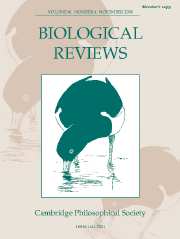Article contents
The fundamental processes in ecology: a thought experiment on extraterrestrial biospheres
Published online by Cambridge University Press: 20 May 2003
Abstract
Ecological science is often organised as a hierarchical series of entities: genes, individuals, populations, species, communities, ecosystems and biosphere. Here, I consider an alternative process-based approach to ecology, and analyse the nature of the fundamental processes in ecology. These fundamental processes are discussed in the context of the following question: ‘for any planet with carbon-based life, which persists over geological time scales, what are the minimum set of ecological processes that must be present?’ I suggest that the following processes would be present on any such planet: energy flow, multiple guilds, ecological trade-offs leading to within-guild biodiversity, ecological hypercycles, merging of organismal and ecological physiology, carbon sequestration and possibly photosynthesis. Nutrient cycling is described as an emergent property of these fundamental processes. I discuss reasons why a biosphere based on a single species with no nutrient cycling is very unlikely to exist. I also describe the concept of ‘Gaian effect’. This suggests that some processes will always tend to extend the lifespan of a biosphere in which they develop (positive Gaian effect) while others could either increase or decrease (negative Gaian effect) such a lifespan. These ideas are discussed in the context of astrobiology, ecosystem services, conservation biology and Gaia theory.
Keywords
- Type
- Review Article
- Information
- Copyright
- Cambridge Philosophical Society 2002
- 21
- Cited by


